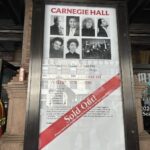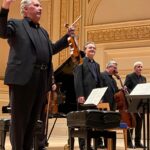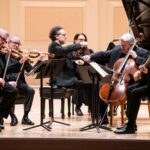The sold-out concert in honor of Andrei Sakharov was held on Sakharov’s birthday, May 21st, at Carnegie Hall. It was a truly historic and extraordinary musical event, a fitting tribute to the Russian scientist and human rights activist, whose moral authority remains influential throughout the world. The line-up of the musical talent, including Evgeny Kissin, Lera Auerbach, Maxim Vengerov, Gidon Kremer, Steven Isserlis, Georgijs Osokins and the Emerson String Quartet, was unprecedented (see New York Classical Review for more details). The concert lasted for three hours, filling the Stern Auditorium/Perelman Stage with incredible rendition of beautifully seleted pieces of music (see the concert program), the performances greeted with lasting standing ovations. One could hear many guests repeating the same remark, “the best concert I’ve been to in my life”.
Concert in honor of Andrei Sakharov
A post-concert gala dinner was held at Rohatyn Reception Room. Distinguished speakers, including Natan Sharansky, Katrina vanden Heuvel, Ian Shipsey, David Remnick and Arkady Ostrovsky, delivered wonderful tributes to Sakharov, …
Stars align to honor human-rights champion Sakharov at Carnegie by David Wright at New York Classical Review What would it take to bring international stars such as violinists Gidon Kremer and Maxim Vengerov, …
The Andrei Sakharov Foundation wishes to thank the following people and organizations for their help and support: Carnegie Hall: Clive Gillinson Nolan Robertson Anna Weber and all other highly professional members of the team — for doing …





